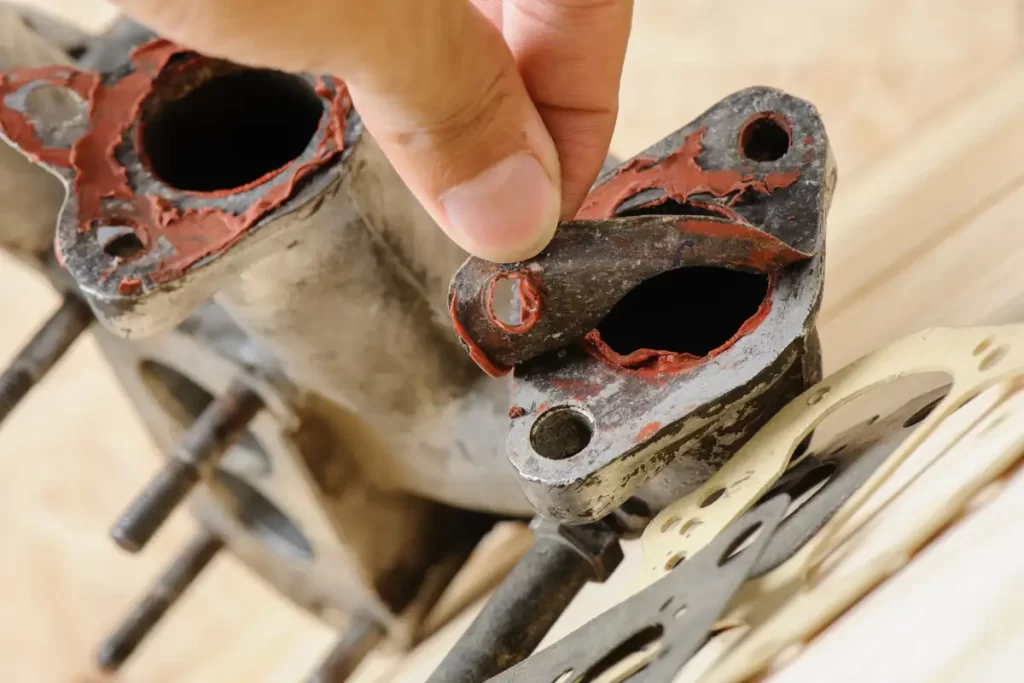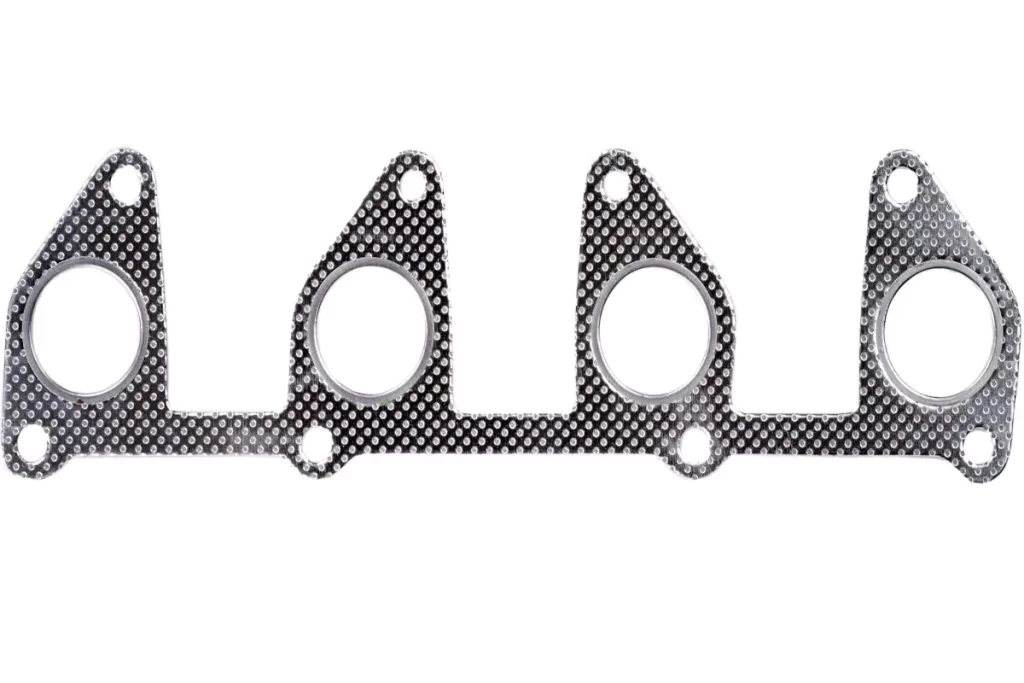Car exhaust manifold gaskets are reusable, but it’s not recommended since they lose adhesion and break down from the heat.
Why would you want to reuse a car exhaust manifold gasket? Can you stack gaskets on top of old gaskets?
Keep reading to learn all about exhaust manifold gaskets.
Let’s Find Out If Car Exhaust Manifold Gaskets Are Reusable
Technically you can reuse an old car exhaust manifold gasket. However, you should only reuse a gasket if it’s repairable and isn’t significantly broken beyond repair. Most car experts only recommend that you reuse your gasket if it still looks brand new or absolutely necessary. You should replace an exhaust manifold gasket while you are at it as they are relatively cheaper to replace compared to any engine work as a result of installing a bad or leaky gasket.
- Let's Find Out If Car Exhaust Manifold Gaskets Are Reusable
- Can You Add A Sealant And Reuse The Old Car Manifold Gasket?
- Is It Better To Use A New Car Exhaust Manifold Gasket When Replacing It?
- Can You Put A New Car Exhaust Manifold Gasket Over An Old One?
- Can You Put Two New Car Exhaust Manifold Gaskets Over Each Other?
- What Are The Signs That You Should Replace Your Car Exhaust Manifold Gasket?
- How Long Does The Car Exhaust Manifold Last?
- Conclusion
- Sources

Exhaust manifolds are an important part of a car’s exhaust system. These parts connect to the car’s engine, collecting the gasses as the system expels them. An exhaust manifold gasket is a small device on the ends of the exhaust manifold.
The gaskets attach the manifold to the multiple engine cylinders, allowing the gasses to be safely moved. The gaskets attach the manifold pipes to these cylinders and prevent any gasses from leaking into the car’s cabin.
These gaskets perform several important tasks, including the following:
- Enhance engine performance
- Inhibit loud noises
- Provides fresh air
- Removes combusted gasses
- Protects the driver and passengers from toxic fumes
- Protects the environment
If you smell burning gas or other unpleasant scents in your car’s cabin, it could be a broken or malfunctioning gasket. Since the gasket helps seal the manifold and prevent leaking, unpleasant smells can hint at a failing gasket.
A loud or shaking engine is one of the first indications of a failing gasket. The gasket might start to leak if the engine is rumbling or making a grumbling noise (especially when accelerating). This is the best time to intervene since you can prevent a more serious issue from arising.
Reusing a gasket will probably cause more trouble than it’s worth. Ask yourself whether the gasket will properly reseal once removed and increase the probability of a gas leak. The effort might not be worth the struggle.
We’ll dive deeper into the causes and symptoms of a failing manifold gasket below!
Related:
- What Is The Purpose Of Exhaust Manifolds In A Vehicle? (Explained)
- What Are Car Exhaust Manifold Bolts Made Of? (Answered)
- What Metal Are Vehicle Exhaust Pipes Made Of? (Answered)
Can You Add A Sealant And Reuse The Old Car Manifold Gasket?
While a sealant might be effective if used properly to increase a gasket’s strength, it might not be worth the effort. The simplest solution is to replace an old gasket with a new one. Reusing a gasket takes significant effort, and adding a sealant will likely prove ineffective at increasing adhesion.
There’s significant disagreement over the efficacy of reusing manifold gaskets. This is especially true for the original equipment manufacturer (OEM) gaskets.
Some argue the OEM gaskets are of higher quality than store-bought varieties. If the OEM gaskets are made of metal, they might be worth the extra effort of salvaging. You should use a non-corrosive, non-toxic, and scentless adhesive in these cases.
Some of the best options for sealants include:
These might be worth using to reserve a high-quality gasket. But if you’re using a basic gasket, just buy a new one to ensure it seals properly and prevents gas leaks!
Is It Better To Use A New Car Exhaust Manifold Gasket When Replacing It?

The heat from the engine commonly causes the gasket to warp slightly. This can make reusing the gasket difficult since the seal will be hard to get it to seal correctly. It is better to buy a new gasket than reuse it.
There are two major downsides to resuing a manifold gasket:
- May cause gas leaks
- Is difficult to achieve a new protective effect
Reusing a gasket should only be attempted if the effort is justified. Getting a warped gasket to properly refit onto the pipe can be virtually impossible.
However, it can also be dangerous if the gasket leaks. Leaking gasses don’t only cause unpleasant smells but damage your health.
The exhaust manifold brings dangerous gasses from the engine to the catalytic converter. The catalytic converter transforms toxic fumes into less dangerous fumes before emitting them out of the exhaust pipe.
If the exhaust manifold gasket is leaking, it can cause dangerous fumes to gather inside the car cabin. This can cause you to pass out while driving, have difficulty focusing, or even die.
When your body is exposed to large amounts of carbon monoxide, it can result in carbon monoxide poisoning. Carbon monoxide poisoning converts the oxygen in the blood to toxic carbon monoxide, which can lead to suffocation and heart failure.
This is particularly dangerous while you’re driving. If you start to feel dizzy, nauseous, or like you will pass out, pull over immediately and call for help.
Can You Put A New Car Exhaust Manifold Gasket Over An Old One?
You should not put new gaskets over an old gasket. This will likely only lead to the new gasket not sealing properly and causing gas leaks. Putting a gasket over an older one can cause the seal to break, crack, and release dangerous gasses.
The first thing you might be asking is, why would someone want to put a gasket over an old gasket?
The first reason is simple laziness. Some people don’t want to go through the extra effort of removing an old gasket and think they can slip it over it. If this is your reason, it’s not worth it.
If the gasket doesn’t fit (which is extremely likely), you’ll need to remove the exhaust manifold all over again. This might sound simple, but it has several steps and requires removing several screws, which you risk shredding.
Finally, some people try using two gaskets to fill in gaps. We don’t recommend doing this, either. The extra gasket is unlikely to decrease a gas leak and will rather lead to the gaskets failing to seal.
You can prevent gaps by ensuring the gaskets are the right size and by using a sealant.
Can You Put Two New Car Exhaust Manifold Gaskets Over Each Other?
You can put two new exhaust manifold gaskets over each other. However, this is not recommended. It will likely lead to gas leaks and a failure of the gasket to seal. You’ll most likely be wasting time and risking dangerous gas leaks to save only a few minutes of time and effort.
What Are The Signs That You Should Replace Your Car Exhaust Manifold Gasket?
The exhaust manifold is an important part of the engine’s health and longevity. A failing exhaust manifold usually gets worse with time and causes gas leaks and decreased engine performance. A loud or shaky engine is the very first sign you’re likely to experience a failing exhaust manifold gasket.
Some of the most common symptoms of a leaking or failing exhaust manifold gasket include the following:
- Unpleasant smells
- Shaking engine
- Loud engine (especially during acceleration)
- Feeling dizzy while driving
- Seeing smoke under the hood
- Smelling smoke
- Engine lost power
- Wasted fuel
Since the exhaust manifold pulls toxic chemicals away from the cabin and engine, it also prevents the engine from choking. Internal combustion engines require oxygen (fresh air) to burn fuel and power the engine.
Without oxygen, this process cannot occur, and the engine loses power. Therefore, if you feel your car isn’t accelerating properly, you should get the exhaust manifold checked. If the gaskets leak gas, they can also prevent fresh air from getting to the engine and disrupt its energy output.
A bad exhaust manifold gasket can also cause your car to waste excess fuel. Since the car isn’t getting the oxygen it requires, it takes more effort to propel the car forward. This means your car will use more fuel the worse the issue gets!
Other symptoms are also very dangerous to your health and the environment. Since the catalytic converter isn’t processing the toxic gasses, they enter the environment directly.
When these gasses do not pass through the catalytic converter, they’re simply dumped into the air. While car exhaust fumes are dangerous enough, they’re even more deadly when dumped directly into the air.
These fumes can increase the prevalence of dangerous diseases and respiratory infections. Likewise, having these fumes in a car cabin can cause immediate health risks from carbon monoxide poisoning.
If you experience any of these signs, take your car to the mechanic or check the exhaust manifold immediately!
How Long Does The Car Exhaust Manifold Last?
Most exhaust manifolds last an estimated 2-3 years. However, this heavily depends on how far and often you drive your vehicle. Additionally, an exhaust manifold’s lifespan can be impacted by the type of material it’s made from and the local environment.
The first contributing factor to manifold degradation is the material from which it’s made. The original exhaust manifold is usually the best and can last up to a decade. After-market exhaust manifolds only last up to an average of three years.
Cast iron exhaust manifolds have the longest lifespan. These can last for a very long time as long as they’re maintained, and you don’t live in an extremely cold environment. Road salt, which is used to melt ice on the road, can eat away at the metal in your car.
Cast iron is one of the most resilient, even to salt, but it can still accelerate decay. Most modern manifolds are made with a weaker, yet lighter, aluminum.
During the energy crisis of the 1970s, aluminum exhaust manifolds increased in popularity. They decreased gas consumption since they’re considerably lighter and thus easier for the car to carry. But, they do not last as long as the cast iron variety.
After-market exhaust manifolds have the shortest lifespan, though, since affordability is the main focus.
Conclusion
The exhaust manifold is an integral part of the catalytic converter. It helps make the air safe and clean for breathing and prevents harm to your car’s engine.
Moving the air away from the engine helps support its performance and gives it the power you desire. Keeping this system clean and ready to go is the best way to keep your car’s systems working well.
Sources
Open Bay: Exhaust Manifold Gasket Replacement
Auto Bahn Automotive: THE IMPORTANCE OF THE EXHAUST MANIFOLD GASKET IN JAGUARS
Your Mechanic: Symptoms of a Bad or Failing Exhaust Manifold Gasket
Parallels: What Does OEM Mean and How Does It Work?
Car Bibles: The Best Exhaust Sealants (Review and Buying Guide) in 2022
Alfabb: OK to reuse exhaust manifold gaskets?
Cars: What’s a Catalytic Converter and Why Do People Steal Them?
NHS: Carbon monoxide poisoning
Auto Zone: IS MY EXHAUST MANIFOLD LEAKING?
Energy.Gov: Internal Combustion Engine Basics
Let’s Talk Science: Catalytic Converters
Walker Exhaust: WHY EXHAUST SYSTEMS WEAR OUT
Car Covers: The Effects of Road Salt on Cars & How to Protect Your Vehicle from Salt Damage



